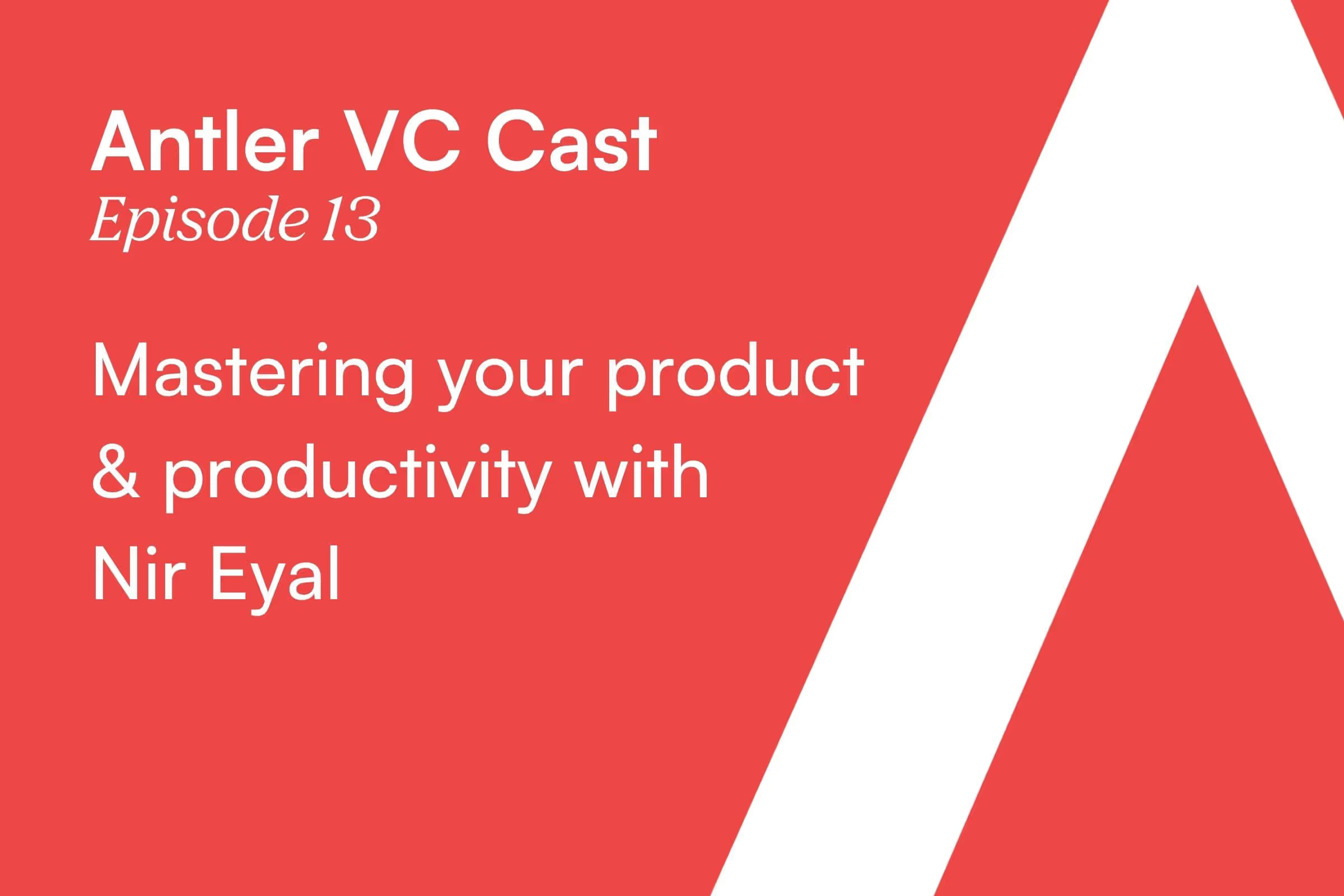Key Highlights From Transcript
[2:03] Nir explains why the "Hook model" is effective for both consumer business and in the enterprise space.
[7:44] Nir explains how a company like Kahoot! exemplifies using the hook model to build habit-forming EdTech for good.
[11:47] Nir shares his own advice for raising Indistractable children with healthy habits in a world full of distracting technology.
On the "Hook Model"
Nir Eyal: The Hook Model is a design pattern intended to connect the user's problem with your product with enough frequency to form a habit. It's a design pattern that we see in YouTube, Google, Facebook, Instagram, WhatsApp, and Slack. All of these world-changing companies that were so good at changing consumer habits have embedded into the product design four basic steps, which are a trigger, an action, a reward, and an investment. And it's through successive cycles through these hooks that our habits are shaped and our tastes are formed.
I talk a lot about consumer web examples like Facebook and Instagram, but I think it's even more important in the enterprise space because now that so many SaaS products are really acquired in the company from the ground up, not sold top-down anymore, you have to get people to use the product or they stop using it, and they stop paying for it. So it's increasingly important on the enterprise side as well.
Understanding consumer habits to increase engagement
Jussi Salovaara: You work with a lot of entrepreneurs, how well versed would you say founders are in this stuff? Or is there still a lot of education to do?
Nir Eyal: I will say there's a lot more recognition around these principles than there used to be. It used to be for quite a long time that people just thought, "Build the best product. That's all you got to do. Just build the best product."
I lived in Silicon Valley for many years, and I can tell you that the startup graveyards are full of companies that had the best product. It doesn't matter if you have the best product, what matters is, can you change a consumer habit? Do you know how to increase engagement and retention? Because you can't win on growth anymore, you can always buy growth.
Quibi is the latest example, unfortunately. $2 billion invested in this company and nobody bothered to check whether people actually wanted to use it. They spent, I don't even know what ungodly sum on ads and placements, and it doesn't do very well because you create what's called "the leaky bucket" - users come in and they all leak out unless you can figure out how to keep them engaged.
On internal and external triggers
Nir Eyal: There are two types of triggers, and the goal of a habit-forming product is to no longer require external triggers. So eventually, the way you know a habit has been formed is that you don't need to prompt the user with another ping or ding or spammy advertising - people are using the product on their own because they want to, not because they have to. That's where the habit is formed. But then how do you do that? You have to create an association with an internal trigger. And this is probably the thing that I think product designers don't think about enough. They only think about the external triggers, they don't think about the internal triggers.
An internal trigger is defined as an uncomfortable emotional state that we seek to escape from. So that can be boredom, loneliness, fatigue, uncertainty, stress, anxiety, any of these uncomfortable feelings that the product will help me alleviate. And by the way, this is why we do everything.
All human behavior is about a desire to escape discomfort. So if you can be that product that is the first-to-mind solution - that when I feel X, I do Y - if you can be that Y, that's a huge competitive advantage.
On raising indistractable children
Nir Eyal: What I see all the time is parents telling their kids, "Get off your phone. Stop using Fortnite," as they're checking Facebook. We can't do that because children come born with what I call a hypocrisy detection device. They have these little detectors built into their brains that are looking for when you're being a hypocrite, and they will call you out on it. So we have to model what it's like to be indistractable ourselves. That's step one. Then what we do is we work our way through these four steps that I talk about in Indistractable. First, mastering those internal triggers, making time for traction. One of the best things you can do for your kid is to teach them how to schedule their time, starting at five years old.
You want to play a game online? No problem. When? Let's put that time in the calendar right now. Because if you decide when you want to spend that time, there's no problem.
The time you plan to waste is not wasted time, as long as you plan for it.
There hasn't been even one study, not one, that shows that three hours or less of age-appropriate screen time has any deleterious effects. Where we start seeing deleterious effects is four or five, six hours a day.
The next step is to hack back those external triggers. What the data is showing us - and what you don't hear very often - is that it's not the social media or the technology that's the problem, it's what the technology is displacing, what that time is eating up. And it turns out, what we're finding increasingly is that the cost is sleep. It's been fascinating because we have some new research just out now that's looked at what's happening to kids during the pandemic. And would you believe it, the studies are finding that children are doing better psychologically now than they were before the pandemic. Despite the fact that they report a high percentage of them know someone who has coronavirus or their parents have lost their jobs, terrible things are happening in the kids' lives. But on self-reported metrics of psychological well being, they're doing better. You know why? They're sleeping.
On using technology to help us fight distracting technology
Nir Eyal: One app that I use all the time that my daughter also uses is called Forest. You plug in how much time you want to do focused work for. So let's say you say 45 minutes, and then you hit this button that says "plant". And when you hit "plant", a cute little virtual tree gets planted on your screen. You put the phone down and if you do anything with it, the virtual tree dies. You don't want to be a virtual tree murderer. This is something that a five-year-old could use.
This is making a pact, it's making a commitment with yourself. This isn't just about technology, this is a life skill.
On cool companies emerging out of crisis
Puja Bharwani: This year has shown us a lot of industries have thrived, some have died. How do you then determine that?
Nir Eyal: This year has been awesome from an investment perspective. In the last couple of years, I think I made one investment per year, this year I've made four. Same story during the last downturn in 2008. Whenever there are these changes in the world, that's when the habit deck gets reshuffled. For example, with homeschooling - I think the UN said a billion children will try homeschooling for the first time. A billion children, are you kidding me?
With such a large number of children trying homeschooling, if even a tiny fraction of that market decides to stick with it, that's a huge new market. And so I've been making investments in that space specifically around how we can use habits and technology to build these new behaviors, these new healthy habits.
On to-do lists
Nir Eyal: Most people have these mile-long things on their to-do list that they will never get to. I'm guilty of this, I used to do this for years before I embarked on this line of research and uncovered all these studies that show how terrible this is for your personal productivity.
The problem is that behavior change necessitates identity change. If you reinforce an identity of someone who doesn't do what they say they're going to do day after day, week after week, month after month, you are reinforcing your identity as a loser, someone who lies to themselves. We don't realize that it has a huge psychological toll, because the problem with to-do lists is that there's no constraint, you can add and add, and add, and add.
Your to-do list should be your schedule. So it's not that I'm anti-to-do list, I'm anti-running your life with a to-do list. If you wake up in the morning and the first thing you look for, and you say, "What do I do? Let me look at my to-do list," you've already lost. Instead, you should be looking at your calendar because the only way to know what is distraction is to know what is traction. You can't call something a distraction unless you know what it distracted you from. We need to stop measuring ourselves based on how many boxes we checked off. The one metric we need to assess ourselves by is - "did I do what I said I was going to do for as long as I said I would without distraction?" And the kicker is, the people who do that finish more than the to-do list people.
Relevant Links
https://nirandfar.com/schedule-maker/
Summary article: https://www.nirandfar.com/skill-of-the-future/
Distraction Guide: https://www.nirandfar.com/distractions/
Habits vs routines article here: https://www.nirandfar.com/habits/









%20(1)%20(1).jpg)
%202%20(1).avif)
%20%20(1)%20(1).avif)
